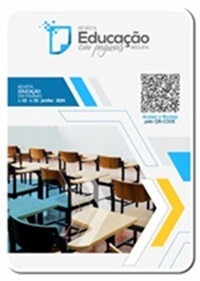Exploring educational management: challenges and opportunities in the culture of ignorance
DOI:
https://doi.org/10.22481/redupa.v3.14934Keywords:
educational management, culture of ignorance, challenges, opportunities, knowledge cultureAbstract
Educational management is the process of directing and managing educational institutions, in order to improve the quality of the educational service they offer to society. Educational management involves the development of managerial skills, such as leadership, decision making and teamwork, as well as the use of innovative and participatory methodologies. Educational management must also take into account diversity and inclusion, as pedagogical principles and social values, which facilitate meaningful and relevant learning for students. Educational management faces various challenges in the 21st century, such as globalization, technology, public and social policies, and the culture of ignorance. The culture of ignorance refers to the phenomenon of ignoring or devaluing the knowledge generated by others, especially by local or indigenous communities. The culture of ignorance can negatively affect the educational process by limiting sources of information, critical perspectives, and learning opportunities. Educational management must promote a culture of knowledge that recognizes and values the diversity of knowledge, that encourages exchange and collaboration between educational actors, and that promotes the generation of new knowledge relevant to sustainable development.
Downloads
References
Barberá, E. (2017). La cultura del desconocimiento y los desafíos de la educación en la sociedad de la información. Aula Abierta, 46(1), 21-30.
Barrantes, R. E. (2018). Brecha digital y educación en América Latina. Revista Iberoamericana de Educación a Distancia, 21(1), 15-34.
Bauman, Zygmunt. "Liquid Modernity." Polity, 2000.
Byram, Michael. "Teaching and Assessing Intercultural Communicative Competence." Multilingual Matters, 1997.
Castells, M. (2001). La Galaxia Internet. Reflexiones sobre Internet, empresa y sociedad. Plaza y Janés.
Cuban, Larry. "The Technology Puzzle: Why the Rhetoric Should be Reality." Educational Leadership, 58(1), 6-11. 2001.
Fadel, Charles et al. "21st Century Skills: Learning for Life in Our Times." John Wiley & Sons, 2015.
Freire, P. (1970). Pedagogy of the Oppressed.
Fullan, Michael. "The New Meaning of Educational Change." Teachers College Press, 2007.
García, A. (2020). Decision-Making in Education: Navigating the Sea of Information. Journal of Educational Leadership, 45(3), 210-225.
Gay, Geneva. "Culturally Responsive Teaching: Theory, Research, and Practice." Teachers College Press, 2010.
Gómez, J. (2020). Adapting to Change: The Role of Educational Leaders in the 21st Century. Educational Management, 35(2), 145-162.
Habermas, Jürgen. "The Theory of Communicative Action, Volume 1: Reason and the Rationalization of Society." Beacon Press, 1984.
Hallinger, P. (2003). Understanding and Assessing the Administrative Organization of Schools: Toward a Theory of Educational Productivity.
Hargittai, E. (2010). Digital na(t)ives? Variation in Internet skills and uses among members of the "net generation". Sociological Inquiry, 80(1), 92-113.
Hargreaves, A., & Fullan, M. (1997). What's worth fighting for in the principalship.
Hargreaves, Andy. "Teaching in the Knowledge Society: Education in the Age of Insecurity." Teachers College Press, 2003.
Jiménez-Pérez, C. (2020). Desafíos educativos en la era digital: Alfabetización mediática y competencia digital en estudiantes universitarios. Investigación Bibliotecológica, 34(78), 151-173.
Johnson, L. (2019). The Knowledge Culture in Education: Challenges and Perspectives. Educational Trends, 28(4), 321-335.
Kahan, Dan M. et al. "Motivated Numeracy and Enlightened Self-Government." Behavioural Public Policy 1, no. 1 (2017): 54-86.
Kwiek, M. (2016). Structural Changes in the Polish Higher Education System: A Fragmented Landscape. European Journal of Higher Education, 6(4), 388-408.
Leithwood, Kenneth et al. "Educational Leadership and Management: Theory, Policy, and Practice." Oxford University Press, 2006.
Lewandowsky, Stephan, Ullrich K. H. Ecker, and John Cook. "Beyond Misinformation: Understanding and Coping with the 'Post-Truth' Era." Journal of Applied Research in Memory and Cognition 6, no. 4 (2017): 353-369.
Lugo-Ocando, J. (2013). The media and poverty: Media's role in representing poor people's thoughts, ideas, and policies. Routledge.
Martínez, M. (2021). Technology and Pedagogy in Educational Management: Trends and Challenges. International Journal of Educational Administration, 40(1), 56-71.
Marzano, R. J., & Waters, T. (2005). School Leadership That Works: From Research to Results.
Minguela-Rata, B. (2018). Alfabetización mediática e inclusión digital en América Latina. Revista Interamericana de Bibliotecología, 41(3), 261-268.
Nussbaum, Martha. "Anger and Forgiveness: Resentment, Generosity, Justice." Oxford University Press, 2016
Parekh, B. (2006). Rethinking multiculturalism: Cultural diversity and political theory. Harvard University Press.
Pérez, R. (2019). Harnessing Digital Resources for Educational Enhancement. Educational Technology Journal, 12(2), 89-104.
Platón. "Diálogos de Platón." Clásicos de Grecia y Roma, 2010.
Postman, Neil. "Amusing Ourselves to Death: Public Discourse in the Age of Show Business." Penguin, 1985.
Reeves, Douglas B. "Accountability for Learning: How Teachers and School Leaders Can Take Charge." ASCD, 2004.
Riggs, F. W. (1964). Administration in Developing Countries: The Theory of Prismatic Society.
Robinson, Ken. "Out of Our Minds: Learning to be Creative." Capstone, 2011.
Rodríguez, S. (2018). Data-Driven Decision Making in Education: Best Practices and Pitfalls. Educational Administration Quarterly, 44(3), 345-360.
Sagan, Carl. "The Demon-Haunted World: Science as a Candle in the Dark." Ballantine Books, 1995.
Schattle, Hans. "The Practices of Global Citizenship." Rowman & Littlefield, 2009.
Schraw, G. (2007). Knowledge: Structures and processes. Psychology Press.
Smith, D. R. (1997). Culture of Ignorance: A Critical Ethnography of Schooling, Society, and Curriculum.
Smith, P. (2017). The Culture of Uncertainty: Implications for Educational Leadership. Journal of Educational Management, 38(4), 432-448. Banks, James A. "Cultural Diversity and Education: Foundations, Curriculum, and Teaching." Routledge, 2001.
Wardle, Claire, and Hossein Derakhshan. "Information Disorder: Toward an Interdisciplinary Framework for Research and Policy Making." Council of Europe, 2017.
Downloads
Published
How to Cite
Issue
Section
License
Copyright (c) 2024 Revista Educação em Páginas

This work is licensed under a Creative Commons Attribution 4.0 International License.






